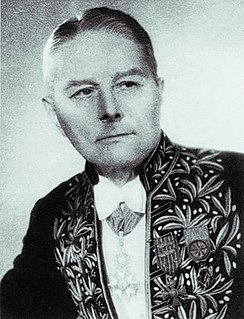Related Research Articles

Thomas Bradwardine was an English cleric, scholar, mathematician, physicist, courtier and, very briefly, Archbishop of Canterbury. As a celebrated scholastic philosopher and doctor of theology, he is often called Doctor Profundus.

Richard Simon CO, was a French priest, a member of the Oratorians, who was an influential biblical critic, orientalist and controversialist.

Remy de Gourmont was a French symbolist poet, novelist, and influential critic. He was widely read in his era, and an important influence on Blaise Cendrars and Georges Bataille. The spelling Rémy de Gourmont is incorrect, albeit common.
Bernardus Silvestris, also known as Bernard Silvestris and Bernard Silvester, was a medieval Platonist philosopher and poet of the 12th century.
Dominicus Gundissalinus, also known as Domingo Gundisalvi or Gundisalvo, was a philosopher and translator of Arabic to Medieval Latin active in Toledo. Among his translations, Gundissalinus worked on Avicenna's Liber de philosophia prima and De anima, Ibn Gabirol's Fons vitae, and al-Ghazali's Summa theoricae philosophiae, in collaboration with the Jewish philosopher Abraham Ibn Daud and Johannes Hispanus. As a philosopher, Gundissalinus crucially contributed to the Latin assimilation of Arabic philosophy, being the first Latin thinker in receiving and developing doctrines, such as Avicenna's modal ontology or Ibn Gabirol's universal hylomorphism, that would soon be integrated into the thirteenth-century philosophical debate.
Walter of Saint Victor was a mystic philosopher and theologian, and an Augustinian canon of Paris.

The Oxford Calculators were a group of 14th-century thinkers, almost all associated with Merton College, Oxford; for this reason they were dubbed "The Merton School". These men took a strikingly logical and mathematical approach to philosophical problems. The key "calculators", writing in the second quarter of the 14th century, were Thomas Bradwardine, William Heytesbury, Richard Swineshead and John Dumbleton. Using the slightly earlier works of Walter Burley, Gerard of Brussels, and Nicole Oresme, these individuals expanded upon the concepts of 'latitudes' and what real world applications they could apply them to.
Peter of Auvergne was a French philosopher and theologian.

Henry of Marcy, or Henri de Marsiac, was a Cistercian abbot, first of Hautecombe in Savoy (1160–1177), and then of Clairvaux, from 1177 until 1179. He was created Cardinal Bishop of Albano by Pope Alexander III at the Third Lateran Council in 1179.

Edmond Faral was an Algerian-born French medievalist. He became in 1924 Professor of Latin literature at the Collège de France.
Heymeric de Campo (1395–1460) was a Dutch theologian and scholastic philosopher. He was a prominent Albertist, and forerunner of Nicholas of Cusa. He studied at the University of Paris, and taught at Cologne, and Leuven.
John Pagus was a scholastic philosopher at the University of Paris, generally considered the first logician writing at the Arts faculty at Paris.
Charles Higounet was a French historian medievalist, specialising in bastides and the Middle Ages in the southwest of France.
Walter of Bruges was a Franciscan theologian, who flourished at the University of Paris 1267–1269.

André Vauchez FBA is a French medievalist specialising in the history of Christian spirituality. He has studied at the École normale supérieure and the École française de Rome. His thesis, defended in 1978, was published in English as Sainthood in the Later Middle Ages in 1987 and has become a standard reference work.
John Sarrazin, also known as Johannes Sarracenus, John the Sarracen or John Sarrazen, was a twelfth-century scholar. He is known only from his translation of the writings of Pseudo-Dionysius from Greek into Latin.
William of Luxi, O.P., also Guillelmus de Luxi or, was born in the region of Burgundy, France, sometime during the first quarter of the thirteenth century. He was a Dominican friar who became regent master of Theology at the University of Paris and a noted biblical exegete and preacher.
Geneviève Hasenohr is a French philologist and prolific scholar of medieval and Renaissance French literature. She has authored or contributed to more than forty books, written at least fifty academic articles and reviews, and prepared numerous scholarly editions.

The Collège of Bernardins, or Collège Saint-Bernard, located no 20, rue de Poissy in the 5th arrondissement of Paris, is a former Cistercian college of the historic University of Paris. Founded by Stephen of Lexington, abbot of Clairvaux, and built from 1248 with the encouragement of Pope Innocent IV, it served until the French Revolution as the residence for the Cistercian monks, students at the University of Paris.
Guibert of Tournai was a French Franciscan friar, known for his sermons and other writings.
References
- Henricus Weisweiler (1952, Quaestiones ineditae de Assumptione B. V. Mariae
- Ayelet Even-Ezra, “The Questio de officio predicacionis of Gauthier de Château Thierry: A Critical Edition,” Archives d'Histoire Doctrinale et Littéraire du Moyen-Âge 81 (2014), 385-462.